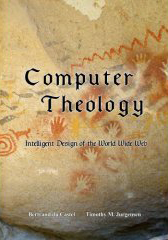PRESS
COMPUTER THEOLOGY |
||||
|
consideration of the intimate relationship of trust and policy, together with
their derivative requirement for the establishment of identity, illuminates the
systemic requirements of these devices such that individuals are able to more
forcefully project the roles that they play within every social infrastructure
that they participate in. To relate
computers to people, we need to understand groups and grouping mechanisms. For
the human species, anticipating the development of group mechanisms was the
development of basic communication among individuals. Within the domain of
computers, personal electronic devices, like people, find their expression in
communication and through this expression they find their persona; their
identity. In the context of network access, be it for telecommunications,
financial transactions, transport or the Internet, personal electronic devices exchange
credentials, warrant the authority and enable the privacy required in the age
of digital society. Moreover, while identity is a central and recurring theme
of an individual personalized computer, their true utility extends into the
conveyance and application of policy that controls actions in specific, though
variable situations. By the end of
the XXth century, the market for personal electronic devices had
expanded enough that we could see their efficacy in several policy domains. For
example, we can specifically note the role of such devices in the field of
international telecommunications with cellular phones with or without digital
capabilities of all sorts, in the flow of financial interchange with
chip-enabled bank cards, in the development of digital entertainment on the
Internet with music players enforcing digital rights and in the establishment
of secure international networks by companies and organizations spanning the
planet with instantaneous links through the auspices of identities protected by
secure tokens. These devices have a common ingredient that we refer to as a
secure core, commonly an embedded computer chip that is used for the secret,
private and highly trusted parts of their operations. While personal
electronic devices were instrumental in the earliest efforts to facilitate
access to and control of complex policy environments, we have come to recognize
that a larger theological perspective is necessary for the shaping of our
understanding of the relationship between real human beings and their network
personae expressed by their secure cores. This recognition further suggested a
need for us to better understand the role of the more intimate aspect of
religious frameworks, particularly the mystic experience that is found at the
base of every religion. Such an intriguing prospect stimulated our consideration
and accompanied us in the extended journey of this writing. Our perspective
is that truly portable, private personal computing devices, like religions, are
ultimately about trust and policy. They embody the current man-machine
interface at the level of establishment, conveyance, implementation and
boundary definition of our complex, often bewildering maze of competing and
conflicting trust and policy infrastructures. They provide for the recognition
of trust authorities and for the identification of the individual within the
spheres of influence of those authorities. Furthermore, they are trusted
conveyors of the policy environment itself, encompassing both authority
and individual identity. A central
characteristic of capability and utility is their ability to act as trusted
arbiters of an individual’s policy choices within that environment. We might
think of them in a certain guise as filling the role of shaman, a bridge between the divine source of trust and the earthly
reality of policy. As we have lived through and subsequently studied the explosive evolution of computer technology and social mores of the last half-century, we have drawn parallels between the development of religion and religious practice through the ages and the manner in which |
||||
|
||||
© Midori Press, LLC, 2008. All rights reserved for all countries. (Inquiries) The contents of ComputerTheology: Intelligent Design of the World Wide Web are presented for the sole purpose of on-line reading to allow the reader to determine whether to purchase the book. Reproduction and other derivative works are expressly forbidden without the written consent of Midori Press. Legal deposit with the US Library of Congress 1-33735636, 2007.
|
ComputerTheology Intelligent Design of the World Wide Web Bertrand du Castel and Timothy M. Jurgensen Midori Press, Austin Texas 1st Edition 2008 (468 pp) ISBN 0-9801821-1-5 |
Book available at Midori Press (regular) |
